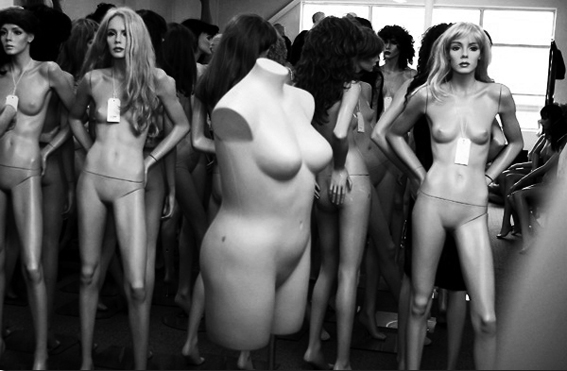
When a friend of mine wrote a blog about how it was unhealthy to introduce size 16 mannequins into Debenhams, I gasped in despair. Size 16 is the average size of women in the UK, so surely having a representative mannequin couldn’t be a health risk? The blog claimed that size 16 mannequins were essentially promoting obesity. When was being a size 16 defined as obese? Did you check the mannequins BMI? The blog certainly didn’t address the fashion industry as a major culprit in promoting body insecurities and eating disorders at the other end of the scale. It was the finest of paradoxes.
When something becomes normalised, i.e. skinny mannequins, we stop asking questions. When someone breaks out of the ‘normal’ we panic, even if it’s a step in the right direction. As soon as Debenhams showed their size 16 mannequins to world, the critics formed a line and the bemoaning began: “Excuse me if I don’t rejoice, show me a size 16 woman with a flat stomach” read a Guardian blog, “politically correct nonsense” another commented.
Mannequins have been hot topic recently, with Venezuela introducing their fantasy mannequin, featuring an incredibly ample bust, plump behind and tiny waist. But what is Venezuela achieving by doing this, apart from promoting body insecurities and giving plastic surgeons a huge endorsement? There is no moral obligation here. The women of Venezuela now have to see plastic enhanced plastic wearing their clothes. Then this fantasy, illusory image of beauty could become normalised. Shock horror.
New York City has also succumbed to mannequin hysteria. If you were walking down East Houston Street recently, American Apparel might have caught your eye. The mannequins were adorned with pubic hair and nipples in the window display. An associate at the store spoke to The Huffington Post and said that the mannequins were meant to convey the “rawness and realness of sexuality.” American Apparel are always controversial and polarising, but could they find a friend in the cynics by trying to emulate ‘realness’, or just come across as vulgar?
Back to UK shores and it seems farcical that some are complaining about size 16 mannequins. Debenhams have seen the moral obligation, and are acting on it. This might be just one small stepping stone in the bid to promote diversity in fashion, but it is a start. Debenhams is one of the first high street stores to ever introduce size 16 mannequins. New Look have tried before, but could this now be the mannequin revolution?
Not quite, but educating the public with a range of female body shapes is promoting a healthier body image. “We trialed size 16 mannequins a few years ago and the feedback was universally positive.” Says Ed Watson, Director of PR at Debenhams. “The revamp of our store on Oxford Street provided the opportunity to design bespoke mannequins. As such size 16 mannequins were on the top of the list for inclusion.”
Some cynics may argue that is merely a grand marketing scheme, tokenism at best, but recently Debenhams have committed to diverse advertising across many platforms. They have produced an inclusive look book using models of all different shapes, sizes, ages and abilities, launched Ben De Lisi’s range ‘Principles’ with a disabled model at the centre and banned retouching that alters body shape.
Debenhams are holding the torch and waiting for the rest to follow. However, it seems the rest are trailing behind in a skeletal warp. “We’ve heard nothing from other stores. We still remain hopeful that others will follow our lead. Showing diverse shapes and sizes is vital in terms of making small steps in relation to body image,” says Watson.
A mannequin revolution is clearly overdue. But putting synthetic non-conscious figurines aside, it is self-esteem that is at the heart of Debenhams’ campaign. “We are trying to make people feel more comfortable with their body and improve self-esteem. In many cases it is the latter that drives being unhealthy in terms of diet and lack of exercise, not a mannequin.”
One small step for man, one giant leap for mankind, said Armstrong. The moon isn’t too far away from fashion land. But the point is this: now my Mum, and the majority of women in the UK, can walk into Debenhams and see an outfit they might not have felt they could wear before, draped on a mannequin closer to their body shape. Perhaps our self-esteem will be lifted, even for a moment that day. I challenge you to find fault with that.
***
 |
Elspeth Merry Contributor Elspeth Merry is a recent University of the Arts London Journalism graduate. She was Features Editor of her University newspaper Arts London News, and is the Features Assistant at 1883 Magazine. She has also written for the Huffington Post and spent last summer in New York writing for Zink Magazine. Find her on Twitter @elspethmerry and visit her website www.elspethmerry.com |

